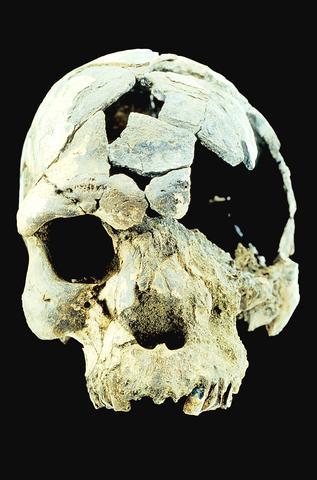Scientists have unearthed three 160,000-year-old human skulls in Ethiopia that are the oldest known and best-preserved fossils of modern humans' immediate predecessors.
The nearly complete skulls of an adult male and a child and the partial skull of a second adult appear to represent a crucial stage of human evolution when the facial features of modern humans arose.
Discovered in Ethiopia's fossil-rich Afar region, the skulls have clearly modern features -- a prominent forehead, flattened face and reduced brow -- that contrast with older humans' projecting, heavy-browed skulls.

PHOTO: AP
"They're not quite completely modern, but they're well on their way. They're close enough to call Homo sapiens,'' said Tim White, a University of California, Berkeley paleontologist who was co-leader of the international team that excavated and analyzed the skulls.
Previously, the earliest fossils of Homo sapiens found in Africa had been dated to about 130,000 to 100,000 years, although they were less complete and sometimes poorly dated, White said.
White and his colleagues assigned the new creatures to a subspecies of Homo sapiens they named Homo sapiens idaltu -- idaltu meaning "elder" in the Afar language.
Two other scientists said the skulls are an important find that fill a big gap in the African human fossil record, the period between about 100,000 and 300,000 years ago.
They agreed with White that the skulls' age and appearance strongly support genetic evidence that modern humans arose in Africa between 100,000 and 200,000 years ago -- and not at multiple locations in Europe, Africa and Asia as some researchers suggest.
Rick Potts, director of the Human Origins Program at the Smithsonian Institution, said the skulls, while still large and thick-boned, are undeniably modern.
Unlike the heavy brows and projecting facial features of earlier humans, in the new skulls those features have retracted dramatically under the braincase and there is a prominent forehead.
Potts said that while White and his colleagues conclude that the fossil skulls are likely those of ancestral subspecies of Homo sapiens, he believes they represent modern Homo sapiens.
Potts said he would not be surprised if additional excavations in Africa push back the origins of modern humans to about 200,000 years -- humans who would have then spread to Europe and Asia.
The skulls were found in a desolate area about 225km northeast of Ethiopia's capital, Addis Ababa, near the village of Herto.
Skull fragments from a total of 10 individuals were unearthed, but conspicuously lacking were their jaws and any bones below the neck.
White said two of the skulls appear to have been scraped clean of flesh, suggesting an ancient mortuary practice, or possibly cannibalism.
Scattered across the same area were thousands of various stone tools, including hand axes, along with the butchered bones of hippopotamus and antelope. White said the site, once the lush shoreline of a large lake, was probably a seasonal foraging ground for the humans.

Four people jailed in the landmark Hong Kong national security trial of "47 democrats" accused of conspiracy to commit subversion were freed today after more than four years behind bars, the second group to be released in a month. Among those freed was long-time political and LGBTQ activist Jimmy Sham (岑子杰), who also led one of Hong Kong’s largest pro-democracy groups, the Civil Human Rights Front, which disbanded in 2021. "Let me spend some time with my family," Sham said after arriving at his home in the Kowloon district of Jordan. "I don’t know how to plan ahead because, to me, it feels

The collapse of the Swiss Birch glacier serves as a chilling warning of the escalating dangers faced by communities worldwide living under the shadow of fragile ice, particularly in Asia, experts said. Footage of the collapse on Wednesday showed a huge cloud of ice and rubble hurtling down the mountainside into the hamlet of Blatten. Swiss Development Cooperation disaster risk reduction adviser Ali Neumann said that while the role of climate change in the case of Blatten “still needs to be investigated,” the wider impacts were clear on the cryosphere — the part of the world covered by frozen water. “Climate change and

Poland is set to hold a presidential runoff election today between two candidates offering starkly different visions for the country’s future. The winner would succeed Polish President Andrzej Duda, a conservative who is finishing his second and final term. The outcome would determine whether Poland embraces a nationalist populist trajectory or pivots more fully toward liberal, pro-European policies. An exit poll by Ipsos would be released when polls close today at 9pm local time, with a margin of error of plus or minus 2 percentage points. Final results are expected tomorrow. Whoever wins can be expected to either help or hinder the

DENIAL: Musk said that the ‘New York Times was lying their ass off,’ after it reported he used so much drugs that he developed bladder problems Elon Musk on Saturday denied a report that he used ketamine and other drugs extensively last year on the US presidential campaign trail. The New York Times on Friday reported that the billionaire adviser to US President Donald Trump used so much ketamine, a powerful anesthetic, that he developed bladder problems. The newspaper said the world’s richest person also took ecstasy and mushrooms, and traveled with a pill box last year, adding that it was not known whether Musk also took drugs while heading the so-called US Department of Government Efficiency (DOGE) after Trump took power in January. In a